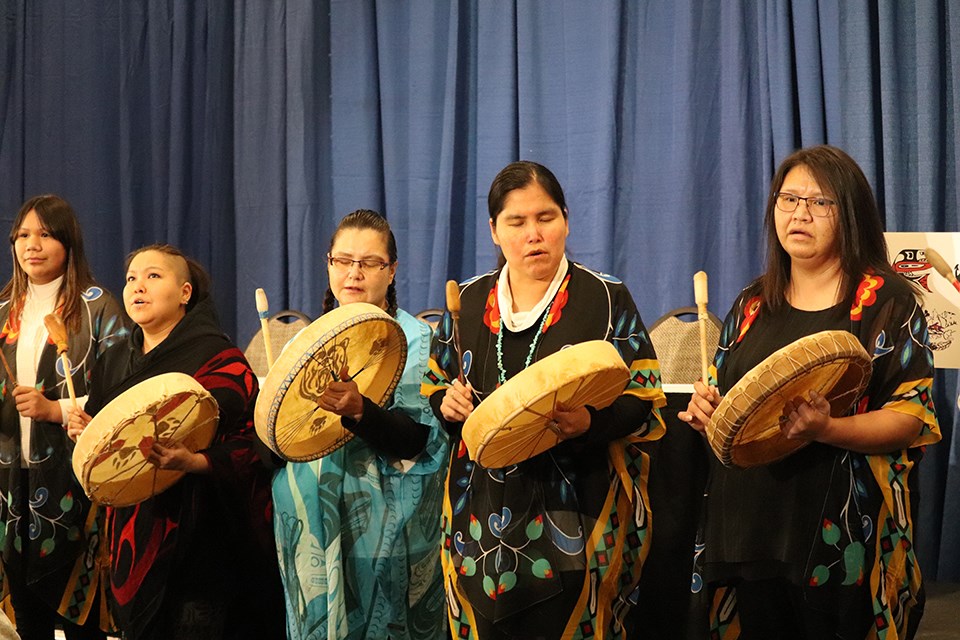Seven Carrier Sekani First Nations celebrated a historic partnership with the province today (Jan. 29), aiming to both boost the economy in the entire region while increasing self-determination for the signatory councils.
It also aims to advance reconciliation between B.C. and the seven Carrier Sekani First Nations by boosting regional economic development, developing partnerships with industry and bringing in new business opportunities and jobs.
Known as the Pathways Forward 2.0 Agreement, it is a five-year renewal of the Pathways Forward 1.0 agreement signed in 2017.
Signatories from Stellat'en First Nation, Nadleh Whut'en, Ts'il Kaz Koh First Nation, Saik'uz First Nation, Nak'azdli Whut'en, Takla Nation and Tl'azt'en Nation joined Premier John Horgan, and other provincial officials, in celebrating signing the agreement at the Uda Dune Baiyoh – House of Ancestors on Third Avenue.
“There’s significance in the provincial government coming to the table and recognizing the rights of Indigenous people and recognizing the Carrier Sekani First Nations have the ability to create processes and make decisions,” British Columbia Assembly of First Nations Regional Chief Terry Teegee tells PrinceGeorgeMatters after the ceremony.
“Free prior and informed consent and that is what our people have been fighting for many years.”
The agreement is the result of work between the seven Nations and the provincial government since 2014, and commits to bringing the federal government to the negotiations in the future.
The province says priorities for continued negotiation of a long-term agreement include lands, forest tenure opportunities and implementation of rights and title.
"This historic partnership with the Carrier Sekani First Nations will help lift people up and make life better for communities throughout the Omineca region," says Premier John Horgan in a release.
"We are taking important steps together to make sure Carrier Sekani communities and all Indigenous communities benefit from economic development and nation building into the future."
The agreement provides revenue sharing and processes for collaborative decision-making to the seven Carrier Sekani First Nations in four main areas: economic development, socio-cultural programming, governance and environmental stewardship.
"The Pathways Forward Agreement is founded on the principles of unity, equity, capacity and economic sustainability,” says Tribal Chief Mina Holmes of the Carrier Sekani in the same release.
“These principles will strengthen the existing relationship between our Nations and neighbouring communities as we are all here to stay. We are committed to continuing to improve these relationships to forge regional sustainability for our people, our land and our governance."
Measures in the agreement include:
- An economic development fund to support business development, partnerships with neighbouring communities and joint ventures that will benefit the economy of the region as a whole ($70 million over five years)
- A wealth fund invested to generate ongoing revenues, to support growth and development in CSFN communities ($15 million in 2020-21)
- Funding for socio-cultural programs to revitalize Carrier and Sekani languages and culture ($12.5 million over five years)
- Provisions for CSFNs to build on governance processes and structures, with a goal of full self-government ($12.5 million over five years)
- Accommodation for impacts on the land from forest and range activities in the territory, which will create certainty and predictability for the forest sector in the region ($40 million over five years)
- Capacity funding for implementing the agreement and continuing negotiations on a long-term, comprehensive reconciliation agreement between CSFNs and the provincial and federal governments ($25 million over five years)
The seven Carrier Sekani First Nations have a combined population of over 8,400 people and a combined territorial span of approximately 69,600 sq. km. (6.96 million hectares), which 7.4 per cent of B.C.



